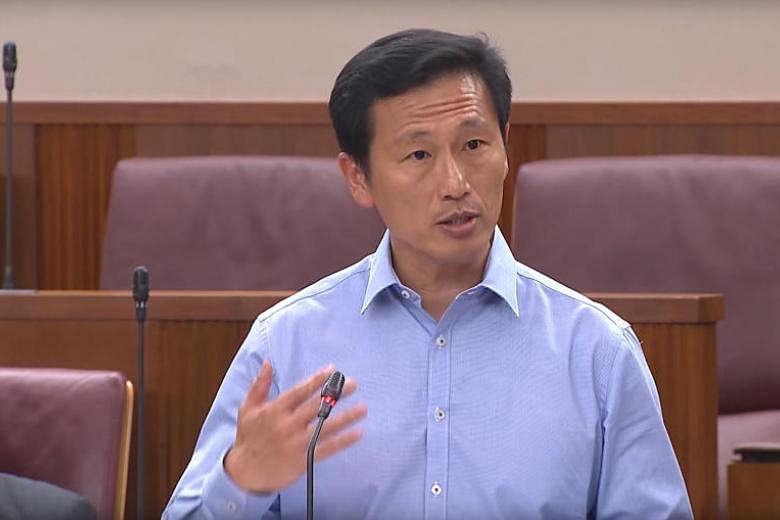SINGAPORE - Any public servants who feel pressure from ministers to take certain courses of action can report this, said Education Minister (Higher Education and Skills) Ong Ye Kung on Monday (Jan 8).
They can turn to the permanent secretaries who head the ministries, the Head of the Civil Service, the Public Service Commission or even the Corrupt Practices Investigation Bureau, he added.
Mr Ong, who is leading public service innovation efforts, was responding to concerns raised by Workers' Party MPs that public servants may come under the undue influence of ministers, under a new law that, among other things, empowers the minister in charge of a statutory board to direct its work, within limits.
The WP MPs said this may lead to the politicisation of the public service, during a two-hour debate on the Public Sector (Governance) Bill, which standardises key governance requirements of statutory boards.
To this, Mr Ong said the legal requirement for statutory boards to abide by ministerial direction is not new, and already exists in the laws that give legal form to the statutory boards.
In fact, the new law makes clear that there are safeguards.
Clause 11 of the Bill states that a minister's direction cannot be given to achieve specific outcomes such as employing or removing a particular person, or asking the police to arrest a certain person, said Mr Ong.
He added that the minister's direction cannot be inconsistent with written law, and cannot prevent public sector agencies from performing statutorily independent or quasi-judicial functions, such as the exercise of judicial functions by the judiciary or the issuance or revoking of licenses by regulators like the Civil Aviation Authority of Singapore.
An explanatory note to the Bill had said that the limits were to prevent the public service from becoming politicised.
Citing this, Mr Faisal Manap (Aljunied GRC) asked Mr Ong what politicised meant in this case.
In response, the minister said that for civil servants to be politicised in the context of the Bill, means to be put under pressure to decide on a specific case.
Ms Sylvia Lim (Aljunied GRC) said that while her party welcomed the drawing of boundaries, she had "some doubts and concerns about how the Bill will be operationalised and what appear to be gaps that may allow the Bill's intentions to be circumvented".
For example, she said, a minister could still speak to a public officer on the side to get things done a certain way, notwithstanding the safeguards.
Another issue brought up by Non-Constituency MP Leon Perera had to do with public servants who aspire to go into politics and become ministers.
Mr Perera had said such public servants may "second-guess" ministers who they work with to curry favour with them, and in the process may become partisan.
He suggested mandating "gardening leave" or a time gap for public servants moving into politics.
But Mr Ong said it was normal for any worker to anticipate the needs of customers and colleagues, adding: "It is very reasonable for civil servants not to be sycophantic but to understand what is the ministerial direction, what is the agenda of this government, how is it shaping up, what are the key directions, and be able to work with the ministers to develop policies in those directions."
He added that the example Mr Perera gave of the Monetary Authority of Singapore (MAS) - MAS officers who resign to join a financial institution must first go on gardening leave - was not relevant as MAS is a regulator of financial institutions, whereas neither the civil service nor political office holders regulate one another or are commercial, profit-seeking entities.
"The conduct and the ethos of civil servants are articulated clearly in the (government instruction manuals), in the career booklets, in the recruitment booklets, that they cannot be politically pressurised. They have to act neutral and in the interest of the public," Mr Ong added.
The minister also said, in response to questions from Nominated MP Mahdev Mohan, that the Bill was not in response to any government lapses or instances where statutory boards refuse to comply with a government direction.
During the debate, Nominated MP Chia Yong Yong expressed disappointment that the new laws embodied "the form but not the spirit of public service".
Ms Chia suggested that the law should include the principle that the Singapore public sector exists to serve the Singapore public.
"Without the spirit of public service, we will be an AI administration - clean, efficient, clinical - but we know that compliance with a set of rules does not make an honest or effective public service agency. Efficiency alone will not in every case serve our people well," she said.
"It is a scrupulous adherance to the integrity of regulations, and a conscientious adherence to the welfare of our people that will make our public service honest, effective, human."
Agreeing, Mr Ong said building a culture of kindness and humanity in the public service goes beyond legislation.


